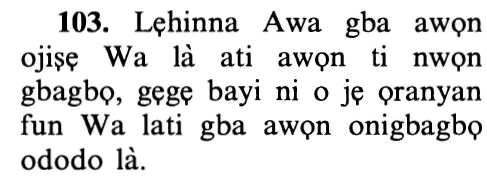10vs103
Select any filter and click on Go! to see results
ثُمَّ نُنَجِّي رُسُلَنَا وَالَّذِينَ آمَنُواْ كَذَلِكَ حَقّاً عَلَيْنَا نُنجِ الْمُؤْمِنِينَ
Thumma nunajjee rusulana waallatheena amanoo kathalika haqqan AAalayna nunjee almumineena
Index Terms
Click to play
Yoruba Translation

Hausa Translation
Sa´an nan kuma Munã kuɓutar da manzanninMu da waɗanda suka yi ĩmãni, kamar wannan ne, tabbatacce ne a gare Mu, Mu kuɓutar da mãsu ĩmãni.
Asbabu n-Nuzuul (Occasions of Revelation)
Concerning Allah's statement,
فَهَلْ يَنتَظِرُونَ إِلاَّ مِثْلَ أَيَّامِ الَّذِينَ خَلَوْاْ مِن قَبْلِهِمْ ...
Then do they wait save for the likes of the days of men who passed away before them,
This means, `Are these who reject you Muhammad, waiting for the vengeance and torment like the Days of Allah, when He punished those who came before them of the previous nations that rejected their Messengers!'
... قُلْ فَانتَظِرُواْ إِنِّي مَعَكُم مِّنَ الْمُنتَظِرِينَ ﴿١٠٢﴾
ثُمَّ نُنَجِّي رُسُلَنَا وَالَّذِينَ آمَنُواْ ...
Say: "Wait then, I am waiting with you among those who wait.'' Then We save Our Messengers and those who believe!
This means, `Verily, We destroy those who reject the Messengers.'
... كَذَلِكَ حَقًّا عَلَيْنَا نُنجِ الْمُؤْمِنِينَ ﴿١٠٣﴾
Thus it is incumbent upon Us to save the believers.
This means that this is a right that Allah, the Exalted, has obligated upon His Noble Self.
This is similar to His statement,
كَتَبَ رَبُّكُمْ عَلَى نَفْسِهِ الرَّحْمَةَ
Your Lord has written (prescribed) mercy for Himself. (6:54)
" كذلك حقا علينا ننجي المؤمنين " أي حقا أوجبه الله على نفسه الكريمة كقوله " كتب ربكم على نفسه الرحمة " وكما جاء في الصحيحين عن رسول الله صلى الله عليه وسلم أنه قال " إن الله كتب كتابا فهو عنده فوق العرش : إن رحمتي سبقت غضبي " .
"ثم ننجي" المضارع لحكاية الحال الماضي "رسلنا والذين آمنوا" من العذاب "كذلك" الإنجاء "حقا علينا ننج المؤمنين" النبي صلى الله عليه وسلم وأصحابه حين تعذيب المشركين
أي من سنتنا إذا أنزلنا بقوم عذابا أخرجنا من بينهم الرسل والمؤمنين , و " ثم " معناه ثم اعلموا أنا ننجي رسلنا .
I'raab - grammatical analysis of the Qur'an
«ثُمَّ» حرف عطف.
«نُنَجِّي رُسُلَنا» فعل مضارع ومفعوله.
«وَ الَّذِينَ» اسم موصول معطوف على رسلنا.
«آمَنُوا» فعل ماض وفاعله والجملة صلة.
«كَذلِكَ» الكاف اسم بمعنى مثل صفة لمفعول مطلق محذوف.
«و ذا» اسم إشارة مضاف إليه. واللام للبعد والكاف للخطاب.
«حَقًّا» مفعول مطلق لفعل محذوف.
«عَلَيْنا» متعلقان بحقا.
«نُنْجِ» فعل مضارع وفاعله محذوف.
«الْمُؤْمِنِينَ» مفعوله.
